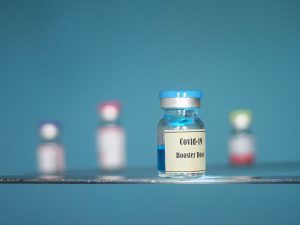With booster shots on the agenda, large life sciences vendors and contract manufacturers are likely to see the COVID-19 windfall continue for the foreseeable future.
It has only been nine months since vaccines began being rolled out to combat COVID-19, but some countries are now administering, or planning to administer, third shots to vulnerable patients.
Nearly a million Americans have already received a booster shot, while a third dose of Pfizer/BioNTech’s vaccine is becoming part and parcel of Israel’s immunization strategy. And yesterday, Moderna submitted a request to the US FDA to authorize a third dose of its offering six months after the initial two.

Photo by Parang Mehta on Unsplash
Society aside, the advent of boosters can only be of benefit to the life sciences sector already reaping the rewards of producing equipment and manufacturing service for the largest global health program.
Catalent and the CDMO side
Take Catalent as an example. The contract development and manufacturing organization (CDMO) said it is set to produce over a billion COVID-19 vaccine doses for various biopharma firms this calendar year, according to a call discussing its fourth quarter FY 2021 results this week. As such, the net COVID-related revenue in fiscal 2021 totalled more than $550 million for the firm, representing about 18 percentage points in the firm’s 25% year-on-year organic growth that clocked in total sales of $4 billion.
And with no slowdown in vaccine demand in sight, in part due to the premise of booster shots, management expects the COVID windfall to continue.
“We do not see a COVID clip in Catalent,” said CEO John Chiminski. “We see vaccines for COVID specifically being really much more of a sustaining and enduring revenue for Catalent, specifically with the advent of boosters that will come out, lowering the age of those vaccines, plus the large part of the world that still needs to get vaccinated.
“We’re also seeing a change in formats, where we want fewer doses per vial. We’re seeing a push towards going towards prefilled syringe and actually all those things actually led to increasing volumes for Catalent as you move towards your single dose or lower volume formats and also boosters.”
As Baird analyst Evan Stover wrote, Catalent’s “global opportunity still has lot of wood to chop.”
It can be assumed other CDMOs working on approved, or soon-to-be approved, vaccines will be in a similar situation. Global demand bolstered by boosters and continued limited capacity can only mean that those with the ability to manufacture vaccines will continue to reap the rewards.
Vendors
And similar expectations are likely across other life services firms.
Last week, Evercore ISI noted that four of the largest life sciences firms – Avantor, Thermo Fisher, Danaher, and Merck MilliporeSigma – are already set to reap more than $6.6 billion of revenues from vaccines in fiscal year 2020-21. But based on around an 80% likelihood of individuals taking a booster shot at a 25% price cut, the extra revenue opportunity from boosters alone will be around $2 billion in fiscal year 2022 for these four firms.
Firms, however, have so far been wary about including booster shots in their guidance.
Sartorius – another vendor reaping the COVID windfall – said in July that corona-related business going forward is very much linked to the aspect of whether booster shots will be necessary.
“It will make all of a difference whether people will rather need them every six months or every 12-month,” said CEO Joachim Kreuzburg. “How many people will be tired of getting vaccinated and how many people will stay and do this? How efficient will future manufacturing processes be? Will they be different and maybe more efficient than those of today? Very difficult to say.
“And that is why we will not give a guidance for this piece of our business.”
Repligen was also cagey on the issue back in July, with CEO Tony Hunt saying that if boosters get approved it will definitely be an upside to overall market demand through the next few years.
“The 2023, 2024 demand will definitely depend on what’s the effectiveness of the vaccine, how long the antibodies last or are boosters going to be required? I think all of those play a big role in 2023 and 2024. But I definitely think COVID is around for the foreseeable future.

schedl_b_and_w.jpg?width=100&auto=webp&quality=80&disable=upscale)


schedl_b_and_w.jpg?width=400&auto=webp&quality=80&disable=upscale)


